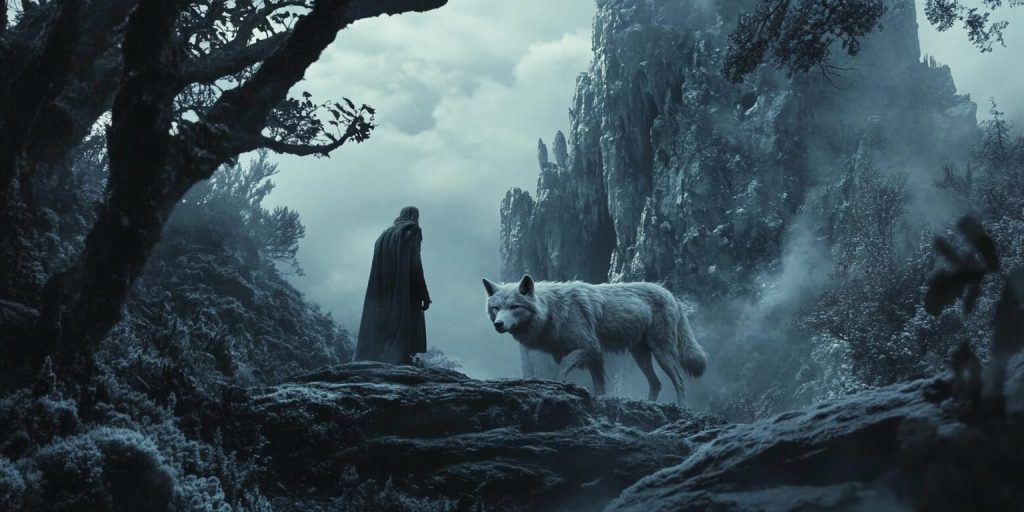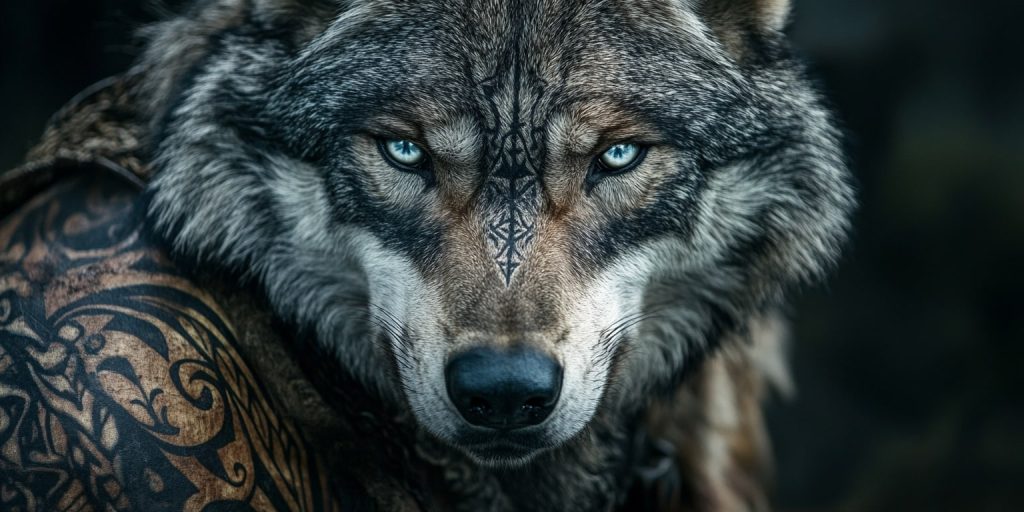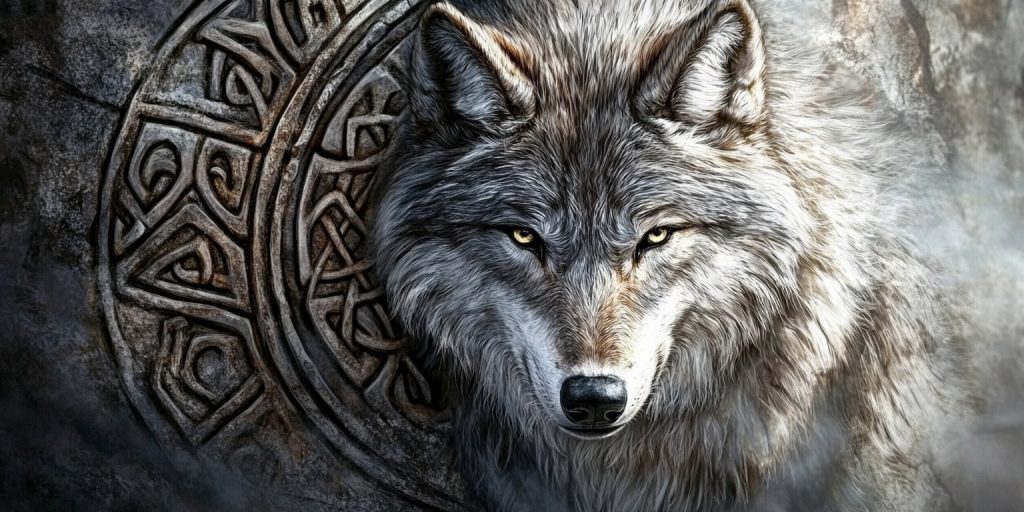Creatures in Norse mythology, Fenrir, Norse Mythology
Who is Ulfr in Norse Mythology?
Ulfr is a key figure in Norse mythology. He represents a mix of power and nature. This wolf-like form shows strength and ferocity, reflecting the ancient people’s love for nature.
We learn about Ulfr from texts like “Norse Mythology: A Guide To The Gods, Heroes, Rituals, and Beliefs” by John Lindow and the “Poetic Edda”. The Old Norse language and culture highlight his importance, especially in the context of the first Viking Age. Wolves symbolize him, especially in the “twilight of the gods ulfr” theme in many sagas.
Introduction to Ulfr in Norse Mythology
Ulfr is a fascinating figure in Norse mythology. It means “wolf” and shows a deep connection to nature. This literal and symbolic connection shows how humans and the wild interact.
The name Ulfr stands for strength, ferocity, and loyalty, values the Norse people held dear. In myths, the Ulfr wolf symbolizes the battle between humans and nature.
Learning about Ulfr helps us understand the values and beliefs of the Vikings. It shows their mix of admiration and fear for the natural world. This mix is key to understanding Viking culture.
Exploring ulfr and its role in Norse lore reveals the importance of wolves in Viking society. It gives us a peek into the ancient stories that shaped the Norse identity.
Understanding the Meaning of “Ulfr” in Old Norse
The term “Ulfr” offers a peek into Old Norse culture. It means “wolf” and is linked to power, nature, and strength. This word is key to understanding Scandinavian heritage.
Origins of the Name
The name “Ulfr” comes from ancient Viking texts. Wolves were important to them, often depicted as free spirits in their legends. The word comes from Proto-Germanic, which shows wolves’ role in Northern European myths, as the Icelandic dictionary defines it.
“Norse Mythology for Beginners” by Jessie L. Crow explains its history and helps us understand how the term “úlfr” evolved.
Variations in Spelling and Usage
Names like “Ulf” and “Úlfarr” appear in old texts and runestones. These changes show how different areas of Scandinavia used the name. “Runes: Reading the Past” talks about this.
Each spelling, like “ulf” or “úlfarr,” has its own story. They connect different beliefs and practices of the time.
Ulfr Norse: A Symbol of Power and Nature

In Norse mythology, Ulfr is a symbol of power and loyalty. It shows the importance of wolves in tribal identity. Wolves were seen as guardians and hunters, the key to Viking survival, and the content of their stories reflects their significance.
Their imagery was in Viking rituals. It showed the bond between nature and the tribe.
Ulfr as a Wolf Figure
Ulfr is a symbol of strength and loyalty as a wolf. In Viking culture, it’s a fierce clan protector, which shows the tribe’s spirit and bond with nature.
Connection to the “Twilight of the Gods”
Ulfr’s story is linked to Ragnarok, the “Twilight of the Gods.” In these tales, gods fight against nature, including wolves. The ulfr wolf represents both the end and a new beginning.
Wolves, like Fenrir, are key in these stories, often portrayed as beings capable of both creation and destruction, which would resonate with the Viking ethos. They signal big changes in the Norse world.
The Role of Ulfr in Viking Culture
Ulfr is very important in Viking culture. He is found in stories and art. His stories show his deep meaning, and he is also seen in art.
Ulfr in Viking Literature
Ulfr is often depicted in Viking stories. He symbolizes strength and courage, and stories like “The Sagas of the Kings of Norway” tell about him.
These stories make us understand Viking life better. They teach us about their values.
Representation in Art and Folklore
Ulfr is also seen in Viking art. “Nordic Art in the Viking Age” discusses wolf symbols linked to Ulfr.
Local stories also tell about Ulfr, emphasizing his role in the Swedish folklore tradition. They mix old beliefs with new views, showing how Norse mythology would evolve. This shows Ulfr’s lasting impact on stories today.
Ulfr’s Place within the Norse Pantheon
Ulfr’s role in the Norse pantheon shows us how gods relate to each other. He is part of a divine hierarchy, which helps us understand how Norse myths are structured.
Ulfr is linked to other gods, like Odin and Fenrir. Each god has special traits that add to the myth’s story. Their roles show how gods affect both humans and gods.
This connection between gods makes their stories richer. It helps us understand their roles and what they symbolize.

Connection to Other Norse Deities
Ulfr is connected to gods like Odin and Fenrir. Each god has unique qualities that add to the myth’s story. These gods play big roles in stories about fate, power, and the end of the gods, which would intrigue those who know about Norse mythology.
Their stories together show how gods interact. This adds depth to their adventures and what they mean.
Significance of Wolves in Norse Mythology
Wolves are important in Norse myths, symbolizing one aspect of their cultural identity. They stand for both strength and protection, embodying the meaning of old Viking values that would resonate with many. Wolves like Fenrir are key in stories about chaos and order.
These stories show wolves’ role in nature and their beauty, reflecting the meaning of old traditions. Ulfr’s connection to wolves adds to their importance in myths.
Contemporary Interpretations of Ulfr
The name Ulfr is becoming popular again, especially in Scandinavian countries. This shows a growing interest in Norse heritage and myths. Many parents choose Ulfr for their kids because they want to connect with their roots and culture.
Modern Uses of the Name Ulfr
Nowadays, the name Ulfr is used in many ways, not just in history and myths. People choose it to feel connected to their ancestors. Like the wolf in Norse stories, companies and brands also use it to show strength and resilience.
Ulfr in Popular Culture
Ulfr is more visible in movies, books, and games. These stories often include characters inspired by Ulfr, highlighting the free spirit of these mythical beings. They offer adventures and authenticity, drawing in fans of Norse myths.
Conclusion
Ulfr is a key figure in Norse mythology. He shows how power, nature, and identity are connected. His wolf form symbolizes strength, loyalty, and the cycle of life and death.
Looking into Ulfr’s story helps us understand our cultural roots. It shows how myths shape our world today. By exploring these tales, we connect with our shared human experiences.
Ulfr’s legacy is more than just history. He is a part of our shared mythology. For those curious about Ulfr, there are many resources to learn more about his role in Norse lore.

